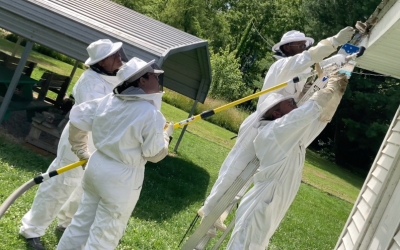Manchester University's Wasp Survey Project has been awarded a grant from the Community Foundation of Wabash County. Funds from the award will support the training of MU Wasp Team members and the purchase of equipment and supplies for the team to use when collecting wasp, hornet, and yellowjacket nests that pose hazards to community members.
Manchester University's Wasp Survey Project has been awarded a grant from the Community Foundation of Wabash County. Funds from the award will support the training of MU Wasp Team members and the purchase of equipment and supplies for the team to use when collecting wasp, hornet, and yellowjacket nests that pose hazards to community members.
Current members of the team include Professor Katy Gray Brown (faculty advisor), Jaden Chin Hong, Elise Harter, Samuel Hupp and Gillian Thompson. The project is a partnership with Green Wasp Removal, a local business.
In July 2023, members of the Manchester University Center for Environmental Resilience and Social Engagement launched the "Community Wasp Survey Project" to document wasp species found in North Manchester and to study the impact that invasive species of wasps are having on beneficial native wasps in the local ecosystem. In the first year of the project, more than 200 wasp, hornet, and yellowjacket nests were removed at no cost to residents. 
The project is spearheaded by the Wasp Survey Team (WST), made up of several Manchester University students and their faculty advisor, Dr. Katy Gray Brown. The WST is trained and mentored by Green Wasp Removal and is supported by local residents who are encouraged to join the project as official Community Participants. Community Participants agree to allow the WST to inspect the exteriors of their properties to document local eusocial wasp species (paper wasps, yellowjackets, hornets). Community Participants stay in touch with the WST throughout the summer/fall wasp season to allow the WST to monitor the development of any wasp nests observed during exterior property inspections. After the seasonal monitoring phase is completed, the WST may remove the wasps when nests reach peak population.
The WST also offers Community Participants free wasp removal services upon request to residents in North Manchester. Removal services involve strictly "green" methods - environmentally responsible protocols - which entirely avoid toxic pesticides in favor of ecologically healthy natural control techniques. Part of the mission of the MU Community Wasp Survey Project is to educate the community about the beneficial nature of wasps and ways to effectively control unwanted wasps without the use of toxic pesticides. This year, the project's work is supported in part by a grant from the Community Foundation of Wabash County dedicated to environmental efforts.
At the end of the wasp season, the wasps collected by the team will be shipped to a venom collection company that provides wasps to biomedical labs for use in Venom Immunotherapy (VIT). VIT is a life-saving medical treatment for people with severe/lethal venom allergies. VIT has a 98% success rate in reducing or eliminating venom allergies, thereby preventing medical emergencies before they can occur.
Wasps are important beneficial insects in the environment. Wasps are helpful pollinators and exceptional biological control agents that help keep pest insect populations from exploding out of control throughout the summer and fall months. Wasps hunt many species of pest insects and feed them to their young for protein, and this activity results in a healthier ecosystem. It is important to recognize wasps as the beneficial insects they are. We encourage residents to avoid poisoning or eliminating wasps if there is any way they can be spared, however if you have a wasp nest that needs to be removed immediately, please contact the MU Wasp Survey Team to handle the removal without toxic chemicals that are harmful to people, pets, and the environment.
To become a Community Participant in the MU Wasp Survey Project, or to report wasp activity anywhere in the community to the Wasp Survey Team, or for general comments/inquiries, please contact the MU Community Wasp Survey Project Hotline at 260-982-5136.